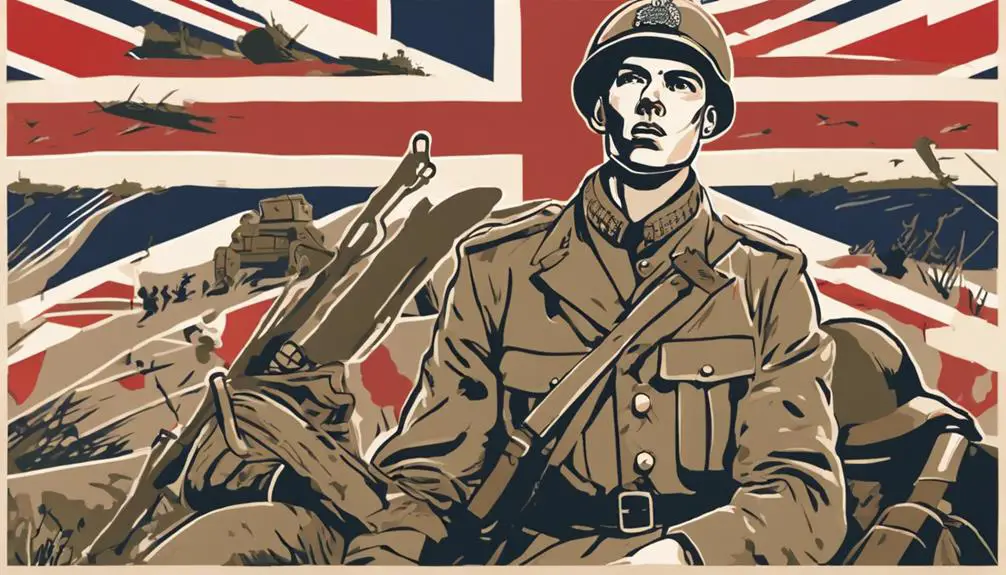You're about to uncover the intricacies of British military slang phrases, born from centuries of colonial history and cultural diversity. These phrases originated in the 18th century for swift battlefield communication and have evolved to cater to the Army's global engagements. You'll discover how common phrases in the field convey critical information quickly, while slang for ranks and roles facilitates identification and effective communication. Emotional triggers are also addressed through specific phrases, fostering trust and teamwork. As you explore further, you'll find how military operations and tactics rely on these phrases to streamline communication and enhance operational readiness.
Origins of Military Slang
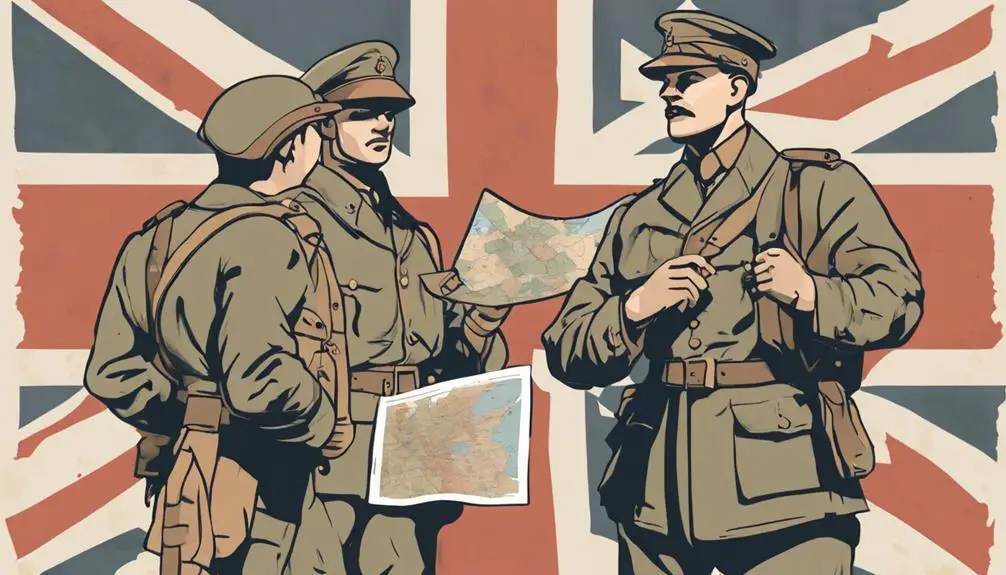
As you explore the world of military slang, you'll uncover a rich tapestry of linguistic evolution that reflects the British Army's historical roots. The origins of these phrases are deeply rooted in the Army's history and cultural heritage, showcasing a fascinating story of linguistic development.
Many expressions have their origins in the British Empire's colonial past, with terminology borrowed from languages like Hindi, Arabic, and Swahili. The Army's cultural heritage has also had a significant impact on shaping slang, drawing influences from British folklore and mythology.
The historical roots of military slang can be traced back to the 18th century, when British soldiers first started using informal language to communicate swiftly and effectively on the battlefield. These phrases evolved over time and spread throughout the Army, often through cultural exchange and borrowing.
You'll notice that numerous slang terms have been adapted from other languages, highlighting the Army's global presence and cultural diversity. As you further explore the world of military slang, you'll uncover a rich tapestry of linguistic evolution, shaped by the British Army's complex history and cultural heritage.
Common Phrases in the Field
You'll often hear British soldiers using phrases like 'Oscar Mike' to confirm they're on the move or 'Wait Out' to signal a temporary halt in operations, demonstrating the practical applications of military slang in the field. These phrases are essential components of field lingo, allowing soldiers to convey critical information quickly and efficiently. In the heat of combat, clear communication is important, and these phrases serve as essential combat cues, ensuring that soldiers can respond swiftly to changing situations.
When you're in the midst of an operation, every second counts, and using concise phrases like 'Stand To' to signal a state of high alert or 'End Ex' to indicate the conclusion of an exercise saves precious time. British soldiers rely on this specialized language to stay focused and adaptable in high-pressure environments. By mastering these phrases, you'll be better equipped to navigate the complexities of military operations and respond effectively to emerging threats.
Slang for Ranks and Roles
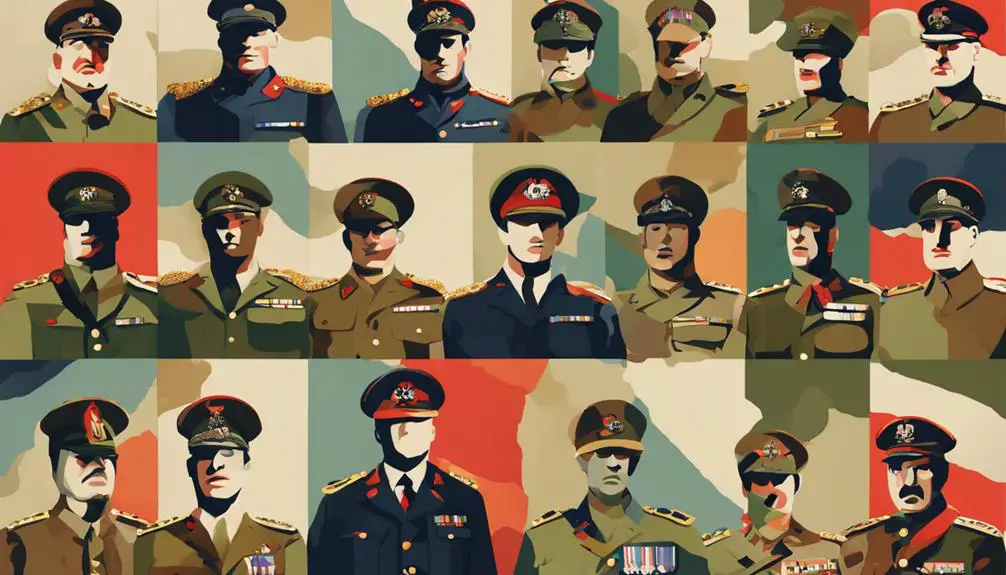
In addition to conveying operational information, British military slang also extends to colloquialisms for ranks and roles, allowing soldiers to quickly identify and address their comrades in the heat of battle.
When communicating with your team, it's essential to use the correct terminology to avoid confusion. Here's a breakdown of some common slang terms used to refer to ranks and roles:
| Rank/Roles | Slang Term |
|---|---|
| Officer | Boss, Mr./Ms./Mrs./Miss (depending on marital status) |
| Non-Commissioned Officer (NCO) | Corporal, Sergeant, Staff Sergeant |
| Junior Ranks | Lads, Lasses (informal) |
| Medic | Doc, Medico |
| Engineer | Sparky |
These colloquialisms are an integral part of the Officer Lingo and Rank Hierarchy within the British military. Using these terms helps to establish a sense of camaraderie and reinforces the chain of command. By familiarizing yourself with these slang terms, you'll be better equipped to communicate effectively with your comrades and navigate the complexities of military operations.
Emotions and Reactions Explained
What emotional triggers can you expect to encounter on the battlefield, and how do you express them using British military slang?
In the heat of combat, you'll likely experience a range of emotions, from fear and anxiety to anger and frustration. To cope with these feelings, British military personnel often employ specific slang phrases to convey their emotional states.
Battle Fatigue, for instance, refers to the physical and mental exhaustion that comes with prolonged combat exposure. When you're feeling drained and demoralized, you might say you're 'going wobbly at the knees' or 'losing the plot.'
Emotional Armour, on the other hand, describes the mental resilience and coping mechanisms that help you navigate the psychological demands of warfare. If you're feeling emotionally shielded or protected, you might say you're 'wearing your game face' or 'keeping a stiff upper lip.'
In the midst of chaos, using these slang phrases can help you quickly convey your emotional state to your comrades, facilitating a faster response and more effective teamwork. By acknowledging and expressing your emotions in a shared language, you can build trust and strengthen bonds within your unit, ultimately enhancing your overall performance on the battlefield.
Military Operations and Tactics
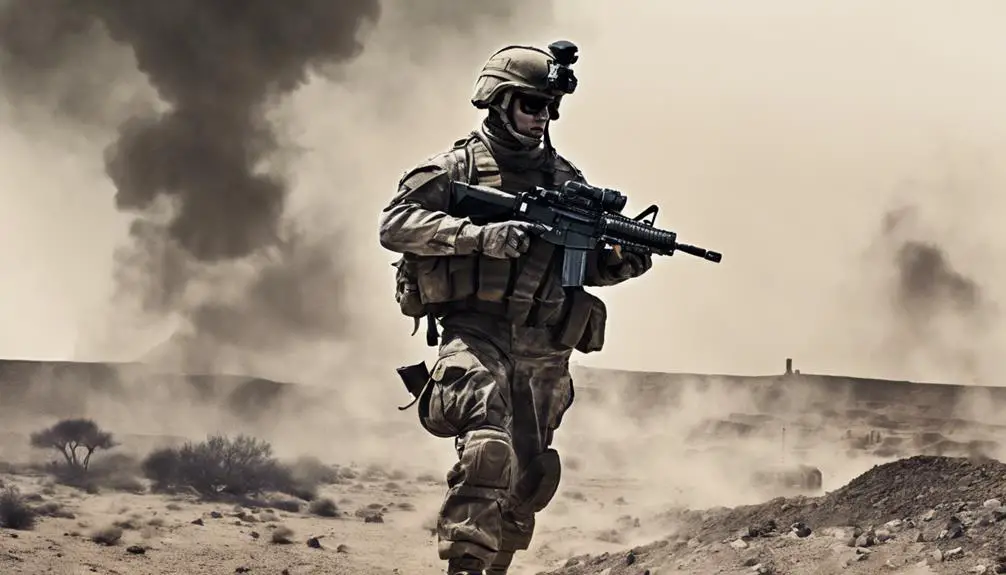
As you move from emotional awareness to operational readiness, British military slang phrases also play a vital role in communicating tactical information and coordinating efforts during military operations. You'll often hear phrases like 'Tactical Insertions' to describe covert operations or 'Electronic Warfare' to disrupt enemy communications. Effective communication is essential in high-stress environments, and British military slang phrases help streamline communication, reducing confusion and increasing efficiency.
Here's a breakdown of some key phrases used in military operations and tactics:
| Phrase | Meaning | Context |
|---|---|---|
| Tactical Insertions | Covert operations, often involving Special Forces | Special Ops |
| Electronic Warfare | Disrupting enemy communications | Cyber Warfare |
| Sitrep | Situation Report, providing updates on operational status | Command Center |
| Blue on Blue | Friendly fire, accidental engagement of friendly forces | Tactical Briefing |
| Red on Red | Enemy forces engaging each other | Intelligence Report |
Equipment and Logistics Lingo
Mastering this gear jargon is vital for effective communication in the field. You'll hear terms like 'Bivvy' for a bivouac, a temporary camp, or 'Sangar' for a fortified sangar, a defensive position.
When it comes to supplies, you'll need to understand your 'Rations Speak'. 'Scran' refers to food, while 'Basher' is a cooking pot. You might receive a 'Hexi' – a hexamine stove – to prepare your meals.
Understanding this unique vocabulary guarantees you can request and receive the correct equipment and supplies, streamlining logistics and supporting successful operations.
Humour and Banter in Slang
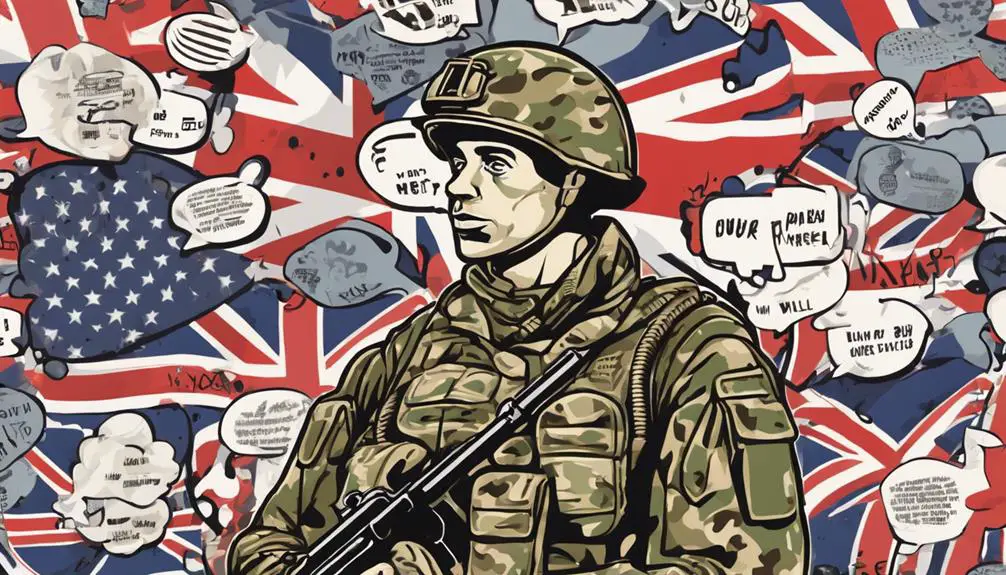
In the British military, slang phrases are often used to inject humour and banter into everyday conversations, helping to alleviate stress and build camaraderie among troops. You'll often hear squaddies (soldiers) exchanging good-natured insults, which might seem harsh to outsiders but are actually a way of bonding and letting off steam. Blokeish insults are a staple of military banter, with soldiers frequently poking fun at each other's appearance, skills, or habits. This lighthearted teasing helps to break the tension and create a sense of belonging.
Squaddie satire is another way humour is used to cope with the pressures of military life. Satirical songs, jokes, and skits are used to poke fun at the military hierarchy, bureaucracy, and even the soldiers themselves. This type of humour helps to humanize the military experience and reminds soldiers that, despite the seriousness of their work, they're still individuals with a sense of humour.
Frequently Asked Questions
Are Military Slang Phrases Used More in Certain Regiments or Divisions?
You might wonder if certain units have their own unique slang. The answer is yes.
Regimental dialects often reflect a unit's distinct identity and culture. You'll find that different regiments or divisions have their own terminology, shaped by their history, role, and traditions.
These dialects reinforce unit identities and foster a sense of belonging among members. As you explore military slang, you'll notice that each regiment's language is infused with its own character and pride.
How Do Military Slang Phrases Vary Across Different Countries' Armies?
As you explore military slang phrases across different countries' armies, you'll notice significant variations. Cultural differences, language barriers, and global influences shape unique regional dialects, often reflecting national identities.
You'll find that phrases in the French Foreign Legion differ from those in the US Marine Corps, just as the Australian Army's slang diverges from that of the Indian Army.
These differences not only reflect local nuances but also reveal the complexities of military communication.
Are Military Slang Phrases Officially Recognized or Discouraged by Military Leaders?
As you explore the world of military slang, you'll find that leaders' views on these phrases vary greatly. While some see them as harmless expressions of military culture, others view them as unprofessional or even disrespectful.
Officially, most militaries don't have a clear policy on slang, but leadership views often influence its usage. Historical context plays a role, as some phrases are rooted in tradition.
Understanding the policy implications of embracing or discouraging slang can reveal a lot about a military's cultural identity.
Can Military Slang Phrases Be Used in Formal Military Communications?
As you navigate the world of formal military communications, remember that clarity is key, just like Caesar's concise Roman decrees.
When it comes to using military slang phrases in formal communications, the answer is a resounding 'no'. Official tone and formal language are paramount, ensuring precision and avoiding ambiguity.
Slang phrases, no matter how ingrained, have no place in formal communications, where clarity and professionalism reign supreme.
Stick to established protocols, and your messages will be as clear as a drill sergeant's commands.
Do Military Slang Phrases Get Updated or Changed Over Time?
As you navigate the domain of military slang, you'll find that phrases evolve over time. This evolution dynamics is driven by cultural adaptation, where new words and phrases emerge to reflect changing values, technologies, and operational environments.
You'll notice that slang phrases get updated or replaced as they lose relevance or become outdated. This organic process guarantees that military slang remains relevant, reflecting the dynamic nature of military culture.
Conclusion
As you explore the world of British military slang, you've uncovered the rich tapestry of phrases born from camaraderie and necessity.
Research suggests that the use of slang in the military serves as a coping mechanism, fostering a sense of belonging and solidarity among troops.
This phenomenon is rooted in the theory of 'ingroup language,' where unique terminology reinforces group identity and distinguishes insiders from outsiders.
By understanding these phrases, you've gained insight into the British military's cultural fabric.

